
When a home emergency happens, homeowners often feel out of control. Instead of being able to control the situation, they are left reacting to what is going on around them. If you want to take a responsive instead of a reactive role, you need to plan ahead and understand the dangers that lurk around your home.
When you understand where the next disaster could strike, you’ll find it a lot easier to prevent them. These steps aren’t complicated, but if you add them into your usual home checks, you’ll likely see the benefits. It isn’t possible to prevent all home disasters, but with a little planning, you can do your best to keep them at bay. Here are ten ways you can prepare for home emergencies and stay one step ahead.
Keep your drains unblocked
Are you guilty of pushing food down the drain because it’s easier than scooping it out of the plug hole? And do you sometimes flush things down the toilet that you know shouldn’t go down there? Blocked drains are not only disgusting to have to deal with, but they can also cause a lot of damage. By making sure you don’t let anything go down the sink or toilet that shouldn’t be there, you’ll be well on your way to protecting your home.

Service your boiler
If your boiler has broken down in the middle of winter, you’ll know how stressful and uncomfortable this can be. A regular boiler service can help to stop small problems becoming bigger problems and also make your heating and hot water more efficiently. A good central heating cover policy will not only provide insurance against breakdowns but it will also include an annual boiler service.
Check your roof
If it is safe to do so, you should check your roof regularly for loose or cracked tiles. Stormy weather isn’t the only time when you should be worried about damage to your roof. In the summer, older roof tiles can crack under the heat. If you then have a summer downpour, you’ll soon know about it inside. Make sure you check your roof every now and then for problems.

Check your electrics
If you notice you’re taking more trips to the fuse box to flick the power back on, it might be time to get your electrics looked at. If any of your plug sockets or light switches have been damaged, this could have an impact on your whole home. You should call in an electrician to check the electrics in your home.
Clear clutter from your kitchen
Your kitchen is often the heart of the home and where most of the activity happens. It’s important that you keep your kitchen clean and free from clutter. There are so many fire hazards in the kitchen and it’s important that you stay one step ahead. Things like grease build up on the inside of your oven and items piled up on your microwave can quickly spell disaster. Check your kitchen appliances regularly and make sure you clear the clutter from your work tops. Tumble dries are another common cause of house fires so make sure you empty the lint tray regularly.
Check pipe insulation
Frozen pipes can cause a lot of damage to the structure of your home in addition to your possessions. All external pipes should be insulated to prevent damage. Make sure that you check your insulation from time to time as the changes in temperature can cause it to shift. You should also check your boiler condensate pipe in the winter months as this is a common reason for boiler breakdowns.

Clean your gutters
If you allow leaves and other debris to build up in your gutters, you are putting extra strain on your guttering. Gutters help to direct rainwater from your roof and into the drains. If your gutters aren’t working correctly, you may find water is pooling around your home and this can lead to dampness inside your house. Clear your gutters at least once a year and check them for damage at the same time. We can help you with this.
Keep trees trimmed back
Trees and large bushes around your home might be nice to look at, but a violent storm could soon make them problematic. If you have any trees which are close enough to reach your home, make sure you get them trimmed and checked for rot. A rotten tree is more likely to fall in a storm and you want to avoid them falling on your home, your car or your garden. When it comes to felling trees, always hire a professional to do the work.
Don’t pave your garden
If you have a lawned garden and you decide you want a more functional space, think twice about your choice of covering. If you opt for a fully paved garden you are more likely to have issues with water getting into your home during periods of heavy rain. To avoid this, consider leaving some of your garden lawned, or install a raised deck which will still allow the rainwater to seep into the ground below.
Install security cameras
Security cameras should be considered a deterrent rather than a preventative tool. If someone really wants to break into your home, a few cameras are unlikely to stop them. That said, they should prevent opportunistic burglars who may decide to move on to the next house if it doesn’t have cameras in place. Once you’ve installed cameras, make sure that you advertise them with home security stickers in prominent places.


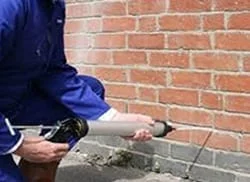 Damp Proofing
Damp Proofing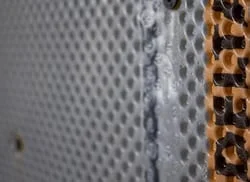 Basement Damp Proofing
Basement Damp Proofing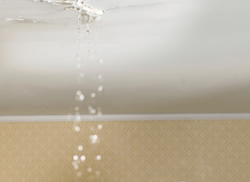 Water Damage
Water Damage Condensation Control
Condensation Control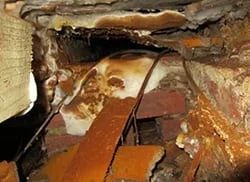 Dry Rot Treatment
Dry Rot Treatment WOODWORM & WET ROT
WOODWORM & WET ROT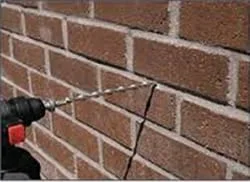 CAVITY Wall Ties
CAVITY Wall Ties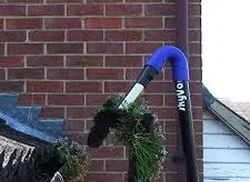 Property Maintenance
Property Maintenance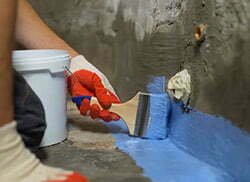 Waterproofing And Tanking
Waterproofing And Tanking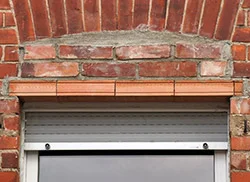 Structural Repairs
Structural Repairs







